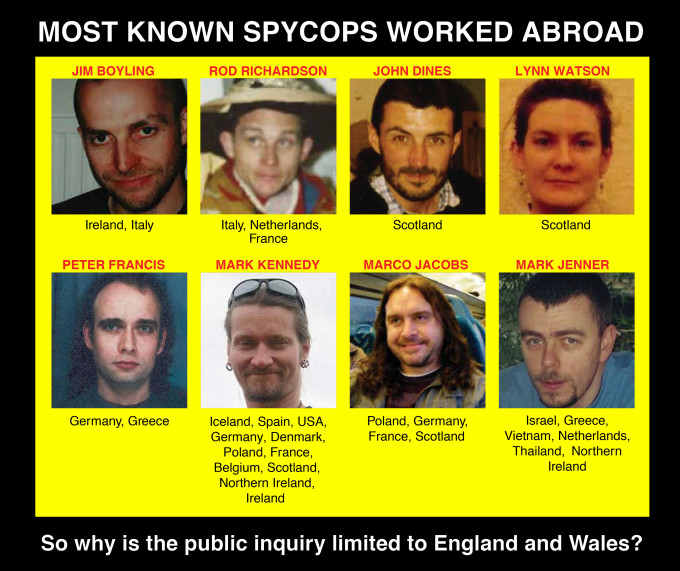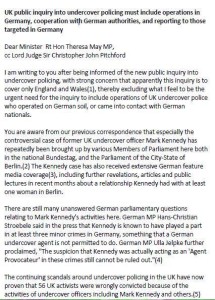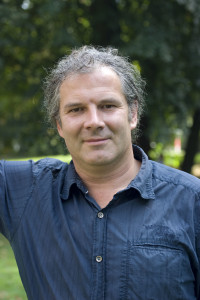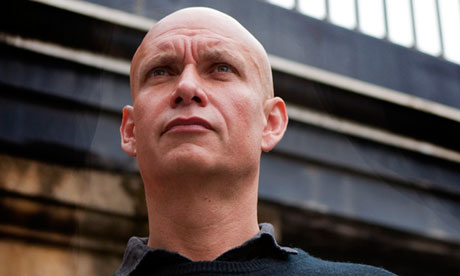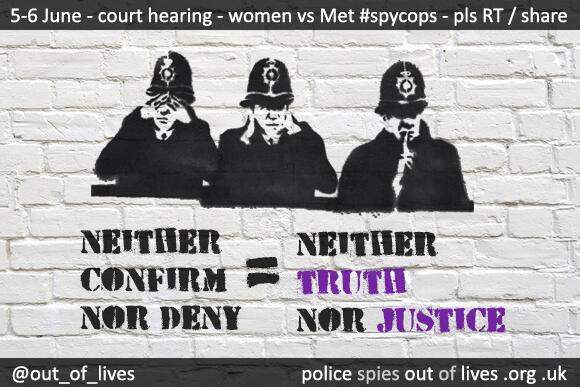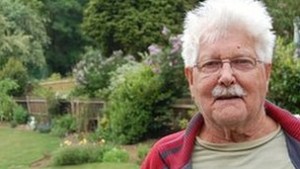
John Catt, permanently spied on even though he has no criminal record
Last autumn’s report into undercover policing by Her Majesty’s Inspectorate of Constabulary (HMIC) was as unimpressive as it was long. The 208 pages devoted much of their attention to non-political policing, even though the report was commissioned as part of the response to the revelation that the Special Demonstration Squad spied on Stephen Lawrence’s family.
The report said it was reassured that everyone knew officers shouldn’t have sexual relationships. Yet it appears there’s always been official banning of it. Despite this, numerous ex-officers have said it was unofficially condoned.
Bob Lambert had four sexual relationships whilst undercover. If it were such a bad idea, you would have thought that when he went on to run the Special Demonstration Squad he would make sure other officers didn’t do it. Instead, his proteges also had relationships – including long-term life partner relationships – and even (as Lambert had done) had children with activists they targeted.
Of the 14 officers so far exposed, 13 had sexual relations with activists they spied on. It’s hard to see this as anything other than accepted strategy. So the HMIC’s sense of ‘reassurance’ is based on a faith that has no basis in fact. That, or a desire to cover-up and protect police who’ve done wrong.
WE’RE COMING FOR YOUR FAMILY
Whilst life-partner sexual relationships are the most complete invasion of a person’s privacy that it is possible for the state to enact, there are others. They integrate into people’s lives and families, affecting non-activists. The official term is ‘collateral intrusion’, as if the deceit and damage done to the activists who are the primary focus is justified, as if those who want a fairer world are legitimate targets for psychological manipulation and abuse.
A 2012 HMIC report – when they thought they could pin everything on disgraced National Public Order Intelligence Unit (NPOIU) agent Mark Kennedy being a sole ‘rogue officer’ – said the evidence
suggests that NPOIU operational supervision, review and oversight were insufficient to identify that his behaviour had led to disproportionate intrusion.
However, when he was part of a group of climate activists who planned to stop a coal train, his authorisation papers say the opposite.
It is very rare for collateral intrusion to occur because [Kennedy’s
name redacted] spends the majority of their time with likeminded people
engaged in activism.
He went straight from the coal train action to a friend’s wedding. People’s children and other relatives were there. And there he is in the pictures, whilst being paid overtime, PC Kennedy.
If the friends and children who formed relationships with him are not deemed not to ‘collateral intrusion’ then they are, therefore, in the target group. Just knowing someone who is an activist, being their friends or parent or child, makes you a legitimate target for these spying operations.
Kennedy spent a lot of time with the family of one of his partners, a woman known as Lily [update: she has now dropped her anonymity and is known by her real name, Kate Wilson] who explained to BBC Radio’s File on Four (download podcast here) that ‘he was on duty every minute that he spent with me’.
Lily’s mother mother took out a family photo and said,
That was my mother’s 90th birthday, as you can see from the balloon in the background. He looks comfortable in the photograph. I keep using that word, ‘comfortable’. I felt very comfortable with Mark and he seemed absolutely devoted to my daughter. He used to stay here, slob around watching TV with us, all that stuff that you do in a relaxed way with people in the family.
Kennedy was sanctioned and approved from on high, and it was no mere rubberstamp job. His authorisation papers include a full side of supportive A4 hand written by the person who oversaw all the secret police units, the National Co-ordinator for Domestic Extremism, Anton Setchell.
So when senior cops at HMIC say they’re reassured that there are no bad relationships, that there’s no collateral intrusion, it’s meaningless and worthless. Just like the Operation Herne inquiry into undercover policing, it’s the police marking their own homework and awarding themselves A grades. There can be no credibility in self-investigation, nor those done by police satellite bodies like HMIC and the Independent Police Complaints Commission. We have given them too much trust for too long and they’ve shown themselves not to deserve it.
GUILT BY ASSOCIATION
Last month’s Supreme Court decision on the John Catt case underlined this. Catt is a 90 year old peace campaigner with no criminal record. After he had attended three demonstrations at the EDO arms factory in his native Brighton, anti-terrorism police stopped his car in London and threatened him and his daughter with arrest under the Terrorism Act if he didn’t tell them where he was going. He later discovered that a marker was placed against his car registration on the Police National Computer and that the network of number plate recognition cameras was used to flag him up to police for stopping.
It’s worth noting that the political police units – Special Demonstration Squad, National Public Order Intelligence Unit and others – have been merged with the Metropolitan Police’s Anti-Terrorist Branch under the name Counter Terrorism Command. Today’s Mark Kennedies are deployed by the same unit as the ones dealing with people who want to set bombs off on public transport. The structure is designed to conflate all dissent.
The Catts mounted a legal challenge but senior officers found their officer’s actions had been ‘proportionate and appropriate’, a finding upheld on appeal to the Independent Police Complaints Commission, which concluded that while the case highlighted the concerns over ‘the civil liberties
or protesters’, police had been acting in accordance with ‘national policy’.
Catt then went to court to challenge the retention of his data on the ‘domestic extremist’ database. He won, at first, but the Metropolitan Police launched an appeal and last month they won. The ‘national policy’ prevails and it is considered legitimate to gather data and harass anyone who has been ‘associated with protest’. It is guilt by association, and what you’re associated with needn’t be criminal either; protest is, in and of itself, seen as something to crack down on.
In other words, the Supreme Court just ruled that anyone who speaks out against the government and the established political order – even though there is no suggestion of any involvement with any crime – can be singled out for special treatment by the police. We have a name for that kind of state.
GUILT BY PROXIMITY
As the wedding guests at the wedding Mark Kennedy attended can attest, you needn’t even be as involved as John Catt. The construction industry blacklist run by the Consulting Association was more than an illegal practice used by most of the industry’s big names to deny work to anyone involved in unions or other political activity. There was a two way exchange of information between the blacklisters and police. Even the Independent Police Complaints Commission admit that it was likely to have been part of all Special Branches’ work to illegally supply the illegal blacklist with information.
But it wasn’t just construction workers. There were files on around 200 environmental activists whose information appears to have come from details given to police when arrested. The file on construction worker Frank Smith describes him as a ‘leading light’ in a group known as the Away Team who sought to protect anti-fascist groups from attack. That’s not the kind of thing a building site manager could observe.
Smith’s girlfriend, Lisa Teuscher, was also spied on and had a blacklist file despite having no connection with the industry.
I was shocked when I first read my file. It made me feel physically sick. It’s absurd. I don’t see any reason why my name should be linked with the building industry. I had no professional involvement whatsoever. The only reason I am on the list is because of Frank.
Remember this when they say that counter-terrorism police are needed to target ‘just the paedos and terrorists’ – their definition of legitimate targets is wide. If this is their definition of political threats, who might be included in their net of potential terrorist threats? To trust Counter Terrorism Command to be making reasonable, proportionate decisions puts a lot of faith in people who have repeatedly proven themselves unworthy of it.
The political police’s choice of who it is reasonable to spy on includes anyone who is politically active, anyone who is related to them, anyone who attends an event at which they’re present. The construction blacklist proves that this is not mere background gathering of information in case it becomes useful. The political policing units have actively broken the law to help ensure their targets are denied work, deliberately inflicting the impacts that has on a person and their family. They are there to disrupt the activities and lives of those they spy on, and that can be anyone.

